Peter MALONE
Spionen/ The Spy
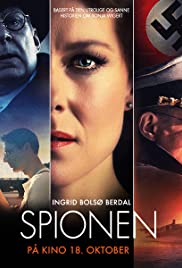
THE SPY/ SPIONEN
Norway, 2018, 110 minutes, Colour.
Ingrid Bolse Berdal, Rolf Lassgard, Damien Chappelle, Alexander Scheer.
Directed by Jens Johnson.
Here is another World War II story, a Scandinavian setting but moving beyond Scandinavia. As the title suggests, it is a story of espionage.
At the centre is a Swedish actress played by Ingrid Bolsa Berdal. She is a successful performer – and is approached by the Nazis to spy for them, holding her father’s health over her. When she does organise his release on these conditions, he disowns her.
The Nazis play on her ambitions, promising her all kinds of success, film roles.
The developing drama has her involved with a great number of ambiguous characters, and her being tangled in requests for counterespionage. And, she is successful in these roles. However, at the end of the war, she was discredited and lost any reputation – which was not rehabilitated until much later, and a contribution by this film.
- The title? World War II? Sweden? Norway? Scandinavian interest? Beyond Scandinavia?
- Stories of World War II espionage, secret agent, the reputation as collaborators, damage to their careers?
- A true story, Sonja Wigert as a celebrated actress, performances in Oslo, her family, her career in Sweden? The situation for her to be a secret agent, double agent? Saving her father from prison? Compromising her relationships? Her career? Her story not being revealed till 2005?
- Sonja, celebrated actress, her performances, her singing, clubs, socials? Her marriage and her husband’s betrayal, the effect on her? Her relationship with her parents, not sympathising with the Nazis, her father’s arrest, bad lungs, in prison? Her organising his release, his not wanting to look at her, his disowning her?
- Sonja, her ambitions, the producer, prospects for the film, the invitation to meet the German commanders? Her not going?
- The approach from the Swedish agency, the discussions with her, putting the case, urging her to collaborate, to make the film, to get information, the plan and the mysterious identity of Maria? Her name as Bill? Her initial refusal, not going to the dinner? The arrest of her father? The meeting with the agent? Ingratiating herself with the authorities, the aim to meet Terboven?
- Her going to the party, the Hungarian diplomat, his criticisms of her, the later encounter, going to the club, the piano and singing, the relationship with him, continuing? His eventual disappearance? Her writing the letter, returned? The information about meeting him in New York later, his rejecting her?
- Sonia and her acting skills, with the Baron, meeting Terboven, the phone call and her excuses for not attending the dinner, the audition for the film, her reading, changing into a performance, Terboven impressed? Then moving into a relationship?
- Terboven, Sonia to get information from Sweden? The discussions about whether Swedes were arming? Her story about her cousin, believed? Getting the information to the agent?
- Sonia and her war activities, compromised with the Swedes, the end of the war, her loss of reputation?
Charm City Kings
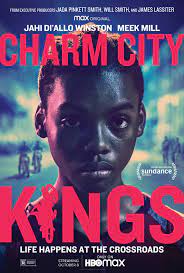
CHARM CITY KINGS
US, 2020, 123 minutes, Colour.
Jahi di' Alli Winston, Meek Mill, Will Catlett, Toyna Parris.
Directed by Angel Manuel Soto.
Baltimore setting, made famous especially by the television series, The Wire.
This time the focus is on a 14-year-old boy, nickname Mouse, living at home, but with peer pressure and ambition, he wants to be part of the Midnight Clique, a dirt bike riding group. He does become involved, but it presents him with moral dilemmas, quick and easy money compared with a good and proper life.
Images of the American cities, poorer neighbourhoods, crime and police, the attraction of bikes, and moral choices for a young boy.
.
- The title? Expectations? An African- American story, characters, issues, crime, drugs, police, prison? In the background of bikes and cars?
- The Baltimore story, the city, views, neighbourhoods, homes, the streets and vehicles, police precincts, garages and repairs…? The musical score?
- Mouse, his story? Age, at home with his mother, her support? The mysterious death of his brother? His passion for bikes, riding? The Ride, Mouse forbidden, going, buying the bike, with his friends? The later meeting Nikki, photography?
- Detective Rivers, following Mouse, knowing him, the death of his brother, his concern for Mouse, his warnings?
- Mouse, the encounters with Blax, the car repairs, working for him? Blax and the background of drug dealing, Mouse’s brother and his death? Detective Rivers and the confrontation with Blax? Mouse working in the auto shop? Riding, his crash?
- Mouse, friends, becoming involved with the drug dealing, midnight Midnight Cinque, the club, mouse and his involvement?
- Mouse, the bike, the encounter with Derrick, the ride, Derrick stealing it, Mouse and his friends, the pursuit, the violent confrontation, the gang arriving, Blax and his beating Derrick?
- Mouse and the difficulties with Blax, the jobs in the auto shop, his friends, rejecting Nikki? Taking up with the drugs, the deliveries? His mother, the money?
- The attack on the store, the shooting, the wife, the effect on Mouse? Detective Rivers, the pursuit? Blax shielding Mouse, his being arrested and taken away?
- A year later, Mouse working again at the vet, with the dog, reuniting with Nicky, groceries for his mother?
Licorice Pizza
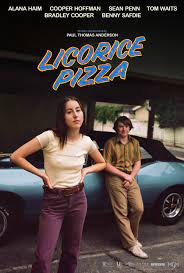
LICORICE PIZZA
US, 2021, 133 minutes, Colour.
Alana Haim, Cooper Hoffman, Sean Penn, Tom Waites, Bradley Cooper, Benny Safdie, Joseph Cross, Maya Rudolph, John Michael Higgins, John C.Reilly.
Directed by Paul Thomas Anderson.
Chalk and cheese, different as… Licorice and pizza, different as… Ugh as we might imagine what this recipe would taste like! But not Ugh as we review this journey back to 1974 under the guidance of Paul Thomas Anderson (and memories of such strong films as Magnolia, There Will be Blood, The Master).
We are taken back to the different neighbourhoods of Los Angeles, to schools, to homes, a flight to New York for a TV show, selling the new waterbeds, setting up a pinball Arcade after the machines become legal, restaurants and diners, Hollywood mansions, headquarters for a mayoral candidate’s campaign… And more. There is a look at the 1970s, media references, movie references, clothes and style, hair, and, a great pleasure for fans of the music of the period, a large selection of contemporary songs by the most prominent of composers.
This is a kind of LA neighbourhood starcrossed lovers’ story, comic style. At the centre is Gary, 15 years old, going to get his class photo taken, smitten by the young woman that he gazes at, introduces himself, and then the brush off! Gary is played by Cooper Hoffman (yes, we see the resemblance, he is the son of Philip Seymour Hoffman). She, Alana, is played by Alana Haim, of music video fame, who appears at the dinner sequence with her actual parents and her two sisters play her sisters here. There is the awkwardness of the age difference – she is 25, Alana awkward, still not having made up her mind what she wants to do with her life, continually encountering Gary who does give her some sense of security.
In a comically tense sequence, Alana proves that she has great skills in truck driving, even in reverse down LA Hills!
This is a kind of LA picaresque story, not exactly a cause and effect narrative. Rather, it is a series of episodes, many episodes, which also introduces a range of supporting characters, Gary and his friends from the TV show (with a sendup of a rather bitchy Lucille Ball (Christine Ebersole), his showbiz connections, and the range of characters he meets with his hustling and wheeler dealing, especially his franchise with the waterbeds (which rely on oil and this is the time of the 70s scarcity), at his pinball Arcade. Some of them are very effective, brief, like an intense conversation initially between Gary and Alana, or Gary taking Alana to an acting interview with quite an interrogation from the agent.
There are some big star episodes which seem to detract from the Gary and Alana story, an indulgence with Sean Penn playing Jack Holden (with the explicit references to William Holden), and singer, Tom Waites. There is also a bizarre episode with Bradley Cooper playing hairdresser turned producer, Barbra Streisand companion, Jon Peters. (One wonders what Paul Thomas Anderson has against Jon Peters!)
Actually, Alana helps out on all Gary’s projects, is distracted by some of his friends, caught up with the celebrities, finally getting a job as a volunteer for the mayoral candidate (Bernie Safdie).
And then, a cheerful ending. And future? Perhaps Licorice Pizza 2. And, with the title, a suggestion that Alana is licorice and Gary is pizza!
- Paul Thomas Anderson, offbeat characters, seen in close-up? Strange interactions? Serious, comic?
- 1974, LA and the neighbourhoods, Sherman Oaks, Encino…? Clothes, styles? The entertainment world, the movie references, television references? The references to cinema personalities of the period?
- The musical score, the wide range of songs, composers, performances, insertions into the action, commentary on the action and characters?
- The title, the contrast, a possible recipe? But Alana as licorice? Gary has pizza?
- The interaction between Alana and Carrie, the age difference, later decades understanding of sexuality and consent, age, abuse?
- Gary’s story, the showbiz background, his mother and her agency, in Las Vegas, leaving him to himself? At age 15, going to the photo, the glimpse of Alana, following her, talking with her, the photo? The continued contact with Alana, the effect on him? Having to go to New York, the TV background, the child actors, persuading his mother for Alana to be his chaperone, at the studio, the make up, Lucille ball and the performance, Yours, Mine, Hours? Her peachy attitude towards the children? Gary and his being cheeky? The other members of the cast – and the actor flirting with Alana, her later going out with him and Gary’s jealous reaction?
- Gary, we were dealer, hustler, the example of the waterbeds, his talking with the salespeople, his setting up his own business, the youngsters or helping, Alana helping? The range of customers, the discussions, the advertising? The irony of the oil embargoes, the waterbeds and the need for oil? Going out of business?
- The pinball Arcade is, becoming legal, Gary setting is up, the young people helping? The customers?
- The contrast with Alana, her being unsure of her future, the youngest of the three sisters, the family sequences, the meal, the visiting actor, his being a Jewish atheist, the father’s reaction?
- Alana meeting with Gary, the scenes at the diner, the conversations, intense, revealing each character?
- Alana, organising herself, importance of relationships, her age, her thinking was weird that she liked being with Gary? The nature of their friendship, intimate, yet friendship? How sexual?
- The episode with Jack Holden, Sean Penn, Alana and her adulation? Tom Waites and his role, compere? In the bike, the jump, Alana falling off? The relevance of these episodes to the story?
- Gary taking Alana to the interview for the movies, that she say yes to everything, getting on a tangle, yet the continually excited attitude of the agent? The small sequence being very effective to reveal character?
- The Jon Peters episode, Jon Peters in real life, with Barbra Streisand, the hairdressing background, film production, the frantic personality, the oil embargo, getting to his date, lacking petrol, leaving Gary and the group in the house, their wanting to get petrol, the huge truck, the youngsters in the back? Petrol out? Alana and driving skills, back down the hills, parking, and then her sitting on the curbside weary?
- Brian, the contact with Alana, the mayoral candidate, Alana and her work, the sisters suspicious man watching and her confronting him? Brian confronting him? The meeting of the television spots, Alana coming into her own with the work,? Appreciated? The many phone calls and her responses? All Brian and his attraction? Some alienation from Gary?
- The candidate, summoning Alana to the restaurant, with his companion, sexual orientation is an dangers for campaigns, her having to escort Matthew home, his breakdown?
- The end, Gary and Alana, the excitement, and his proposal, her acceptance? The future – and the possibility of a sequel?
Sleeping with Danger/ Ann Rule, Sleeping with Danger
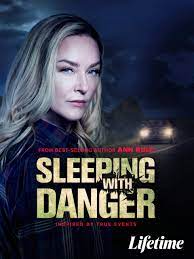
SLEEPING WITH DANGER/ ANN RULE: SLEEPING WITH DANGER
Canada/US, 2021, 85 minutes, Colour.
Elizabeth Rohm, Antonio Cupo.
Directed by David Weaver.
Lifetime has made a number of television films from novels by writer, And Rule. There are usually romantic thrillers. And this is the case here.
The plot is fairly familiar, a middle-aged woman, not settled, wanting a relationship, encounters an attractive man, becomes dependent on him, begins a new life with him, new business, but he gradually reveals his controlling personality, past violence, using his power almost to destroy his wife – who eventually leaves, helps the police to try to find him while he has changed his name and begins a relationship with a woman who resembles the main character. At the end, there are some unexpected violence as the controlling man shoots to associates and then himself.
Elizabeth Rohm plays Grace, a flight attendant, in casual relationships, but advised to contact Paul Carter, Antonio, Cupo, who promises romance, improvement to her health. Middle-aged women in the audience will easily identify with her – and be repelled by Paul Carter.
As mentioned, this is a plot that has been done many times – but this version is for the popular television audience.
I Am Jackie O
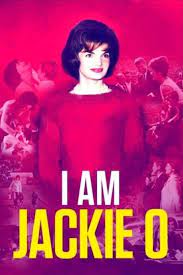
I AM JACKIE O
US, 2020, 84 minutes, Colour.
Directed by Tanya Maryniak, Anna Wallner.
Derek Murray has produced the series of documentaries, I am…, For over a decade. They are 90 minute documentaries, portraits of the subject, effective compendiums of the subject’s life, character, personality, career – and indications why this subject is worthy of our attention.
Most of the series focuses on entertainment personalities, from Bruce Lee to Steve McQueen to Richard Pryor. However, there have been some political portraits, especially, five years before this one, I am JFK Jr.
There is a great deal of material available, of course, for presenting a portrait of Jacqueline Bouvier, of Jacqueline Kennedy, of Jacqueline Onassis. While there is a great deal of home video, there is also the footage of Jacqueline Kennedy’s presence during the Kennedy years and, as remember, his assassination and funeral.
The film fills in the background of Jacqueline Bouvier’s comfortable upbringing, her freewheeling father, her very strict mother. With her education and background, she had a personality with dignity but also with some kind of image.
There is a great deal of footage of Jacqueline Kennedy from 1960 to 1963, focus on her relationship with her husband, comment about her being forgiving in terms of his philandering, the birth and raising of their children, the trauma of the death of her third child, and the grating bonding with her husband. She didn’t always agree with her husband but he relied on her for her media and public presence for his political ends, but she also offered advice and this is shown with the crises of the presidency, Cuba, the missile crisis.
The documentary also highlights her public persona, the response of the media, her becoming a celebrity and treated as such, her contribution to fashion, but also her worldwide presence and popularity, scenes of her with Nina Chris Jeff, on magazine covers all over the world including the Soviet Union.
The film gives appropriate attention to the assassination of John Kennedy, Jacqueline Kennedy’s response, care and protection for her husband dead, the swearing-in of Lyndon Johnson, funeral arrangements, her walking in procession behind her husband’s coffin, with her children, and the famous salute by her son.
Aristotle Onassis is a presence for the Kennedys, especially his offering a yacht cruise to Jacqueline after the death of her child. With her fears about her children being a target for assassinations, especially after the death of Robert Kennedy who served as a kind of father figure for her children, she wanted to get away from the United States. She was friendly with Aristotle Onassis and his background is given (as well as his daughter, Christina’s hostility to Jacqueline).
Opinions are given about their marriage, the bond between them, the very Greek personality of Onassis – and his superstition against Jacqueline with the death of his son.
But, Jackie O continued in popularity after the death of Onassis, becoming involved in publishing and editing, a significant presence in New York City, conservation of Grand Central station, and a firm influence on her children’s life.
She died of cancer in 1994, 64 years of age. She was one of the highlight characters of the 20th century.
Antlers
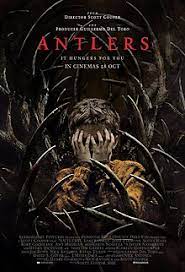
ANTLERS
US, 2021, 99 minutes, Colour.
Keri Russell, Jesse Plemons, Jeremy T.Thomas, Graham Greene, Scott Haze, Rory Cochrane, Amy Madigan.
Directed by Scott Cooper.
Antlers is an arresting title for a horror film. The attention is given to deer, their strength and power, antlers as a sign of strength and as a weapon.
This is a horror film which is above average, quite a strong cast with Keri Russell as a teacher, concerned about a student, a persuasive performance by the young Jeremy T.Thomas, becoming involved in the mysteries of his life and experience – but also listening to a Native American character, played by Graham Greene, explaining Native American myths, the power in animals, like deer, as well as evil presences taking these human and animal forms.
Which means then that there is a humane story underlying the aspect of horror, Keri Russell Julia and unhappy memories of her past and her abusive father, her abandoning home and her brother, Paul, Jesse Plemons, but returning after their father’s death and coming back to the family home, but still tensions between brother and sister. Which gives some edge to Lucas’s story, his brother, Frank, preparing drugs in a vast cavernous tunnel, overcome by the evil spirit in the form of a buck, Lucas confining him and he is very little brother, Aidan, into a locked cell in their house.
The first part of the film focuses on the family issues with the suggestions of horror. The grim horror takes over halfway through, especially with the gruesome killing of the sympathetic school principal, Amy Madigan.
Interestingly, while Paul is the sheriff and has his offices to support him, it is Julia who will exercise the heroics, the confrontation with the evil presence and monster, saving Lucas.
The film was directed by actor Scott Cooper (Crazy Heart, Out of the Furnace, Hostiles).
- The title? Deer? Giant Bucks, size, power, force, antlers?
- The opening information and warning, evil spirits, pursuit, destruction?
- The Native American mythology, the elaboration of the myth, the evil power, taking various forms, destructive? Paul and his scepticism? Julia and her beliefs? The discussions with Warren Stokes? His explanations?
- The setting of the tone, the long tunnel, the darkness, the flare, Frank and his partner, the drug production? Lucas and is waiting in the car, Frank’s strictness? The noises in the tunnel, the eerie presence, the deer, the attack?
- The transition to the story of Julia and Paul? The filling of the background, the images of the abusive father? Paul and is reticence about what happened to him? Julia and her memories, leaving, abandoning Paul? The father’s death? The return, back to the house they grew up in, her taking the teaching job? Paul and his being the sheriff, no one else willing to be the sheriff? Interactions between brother and sister, the tensions? The discussions?
- Julia, teaching, getting the children to tell stories, mythical stories, Lucas, quiet, at the back of the room, his sketches and their eerie content, his telling the savage story, the cannibal ending? The contrast with the young girl and her story of Goldilocks? And the contrast with the bullying boy and his treatment of Lucas? Julia and her concern for him?
- Lucas, age 12, small, bullied, at home, the locks, Frank and his being transformed into a monster, Aidan and his age, in the cell with Frank? Lucas providing food, dead animals, dead humans?
- Julia and her concern, following Lucas, having the ice cream, the discussions, his shrewdness? Julia discussing with the principal, the principal going to the house, unlocking the door, the attack and her death?
- Paul, Dan as his assistant, the police work, the search for the missing principal, the finding of dead bodies? The monster in the barn, the attack on Dan and his death, the attack on Paul, Julia arriving, the rescue?
- Lucas, experiences of terror, his brother loose, Aidan disappearing, his being taken to the hospital, Julia wanting to care for him? Taking him home? His escape, going to the tunnel, Julia entering, finding Aidan?
- The monster in the tunnel, embodiment of evil, Julia and her heroics, the confrontation, the fight, taking out his heart, the knife? Her embracing Aidan and killing him? Taking Lucas home?
- The imagery from the introduction, humans to spoiling the Earth, nature rising against it, and the embodiment of evil powers and destruction? But humans able to conquer the evil presence?
Clifford the Big Red Dog
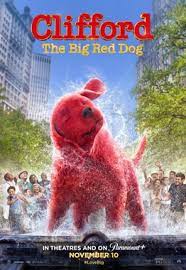
CLIFFORD, THE BIG RED DOG
US, 2021, 96 minutes, Colour.
Darby Camp, Jack Whitehall, Izaac Wang, John Cleese, Sienna Guilllory, Tony Hale, David Alan Grier, Paul Rodriguez, Russell Peters, Tova Feldshuh, Jessica Keenan Wynn, Siobhan Fallon Hogan, Rosie Peres.
Directed by Walt Becker.
For older reviewers, they need to put on their grandparent glasses! And to discover that from 1963 to 1998, there were umpteen cartoon books with Clifford, the red dog is their focus. Which means that this 2021 version, live-action, while it is made for today’s younger audiences, there should be many willing parents and grandparents to accompany the children, happy memories of times with Clifford!
Clifford is part of the litter, mother and others taken in by animal rescue. He gets out and encounters a moustachioed old gentleman sitting in the park, looking a little like Frank Morgan has the Wizard of Oz, but then revealed as John Cleese, Mr Bridwell, older and more portly than John Cleese used to be! And, this is a rather benign John Cleese, friendly, touches of magic, and certainly kindly towards children.
Then we are introduced to Emily Elizabeth (a very sensible name), who is picked on at school. Actually, Darby Camp who plays Emily Elizabeth is a very strong screen presence, seemingly not the little girl and would be bullied or lack self-confidence. She loves animals and goes into Mr Bridwell’s tent of exotic animals and falls in love with Clifford, bright red and very cute.
Emily Elizabeth is being looked after by her undependable uncle, Jack Whitehall, a slob, accident-prone, put down by everyone, lacking self-confidence. He can be very irritating. But, we know that by the end he is going to be lovable and heroic – which happens, more or less!
The big thing is that Emily Elizabeth loves Clifford so much, despite Clifford’s touches of mischief, that overnight he increases to not just being a big red dog but a BIG red dog. Lots of comedy here, smashing things as he tries to move around the apartment, sits on scales and breaks them… Plenty of old-fashioned comedy here.
But, of course, there has to be a villain of the piece, and here is in the form of Tony Hale, a tyrant running a big business to produce more food for the world, experimenting with animals, seeing publicity and promotion with Clifford and claiming him, trying to capture him, sinister and sleazy. We just can’t wait for him to have his comeuppance! E does his bit but, it is over to Emily Elizabeth to be confident, assertive, even give a speech in defence of animals.
There are lots of character actors in supporting roles, especially the inhabitants of the apartment block, African-Americans, Hispanics, Jewish. And Emily Elizabeth’s best friend, Owen, is an American Chinese his millionaire father is very understanding, hospitable, trying to save Clifford.
This is one for the younger audiences, the teenagers might be tempted to think that it is below them (but they should enjoy it also). The film, like Clifford, grows on you and, even in grandparental mode, you find that you have enjoyed it.
Back to the Outback
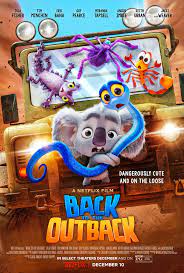
BACK TO THE OUTBACK
Australia/US, 2021, 98 minutes, Colour.
Voices of: Isla Fisher, Guy Pearce, Jacki Weaver, Eric Bana, Wayne Knight, Rachel House, Kylie Minogue, Gia Carides, Tim Minchin, Angus Imrie, Keith Urban, Diesel La Toracca, Aaron Pedersen, Celeste Barber, Miranda Tapsell, Jack Charles.
Directed by Harry Cripps.
Actually, the title is not quite accurate. The animals who are at the centre of this entertaining animation story for younger children’s audiences (and parents and grandparents) have not ever been to the outback (except what they were captured for exhibition when they were very little).
Audiences will probably be very surprised to find that the central characters, with whom we identify and whom we get to like immensely, our are a taipan and, a spider, a scorpion and a lizard. And we have to spend a lot of time with a rather pompous young koala, Pretty Boy, feted by the media and by zoo visitors, who believes his own propaganda! Not exactly the cast list we might have been expecting.
The story opens in Sydney, across the harbour from the Opera house, a wildlife exhibit, loads of visitors and children. One of the key exhibits is, what seems to be but is not, a ferocious crocodile. (In fact, she is a sympathetic Aunt Jackie, voiced by Jacki Weaver.) The man in charge of the exhibit is Chaz and, with many Steve Irwin characteristics (although, to be fair to Steve Irwin, there are some moments when it is explained that Chaz as modelled himself on the actual Steve Irwin!) And his roly poly son, Chazzie.
One of the advantages of this production, Australian with US backing, is the voice cast. A glance at the cast list indicates the wide extent and participation of so many of Australia’s top actors. Even in tiny roles. Isla Fisher is central as Maddie, the heroine, the attractive taipan-blue and (with fears and fangs) who is upset at being called a monster because of type and reputation for kills but is really sweet. And, Tim Minchin has plenty of spotlight as Pretty Boy. (And there are small voice roles for Kylie Minogue, Aaron Pedersen, Jack Charles…).
Eric Bana voices Chaz Hunt, Chaz all talk, full of heroic stories, impossible, from his past, but really a phony who has to deal with his son idealising him.
There is a great deal of enjoyment in seeing how our characters get out of their class cages, find ways to further their escape, find a great deal of help from an Association of Ugly animals, ranging from Tasmanian devils to bats and lizards who band together for rescues. And the adventures take them from Sydney suburbs, to the Blue Mountains, to far beyond, to Uluru, and to the final desert mountains where the creatures will find home again.
Lots of slapstick comedy as well, especially concerning poor old Pretty Boy whose vanity almost has no end and who gets quite slapsticked around but who eventually, bonds and shows a touch of heroism!
Interesting that the insects and snakes should be the centre of this kind of attention. And some speeches for a message about discrimination, acknowledging everyone, not labelling, understanding and appreciation all round.
So, a rollicking comic adventure designed for family entertainment, at home in Australia and, for curious audiences overseas.
Tragedy of Macbeth, The
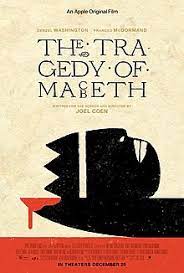
THE TRAGEDY OF MACBETH
US, 21, 107 minutes, Black and white.
Denzel Washington, Frances McDormand, Alex Hassell, Bertie Carvel, Brendan Gleeson, Corey Hawkins, Harry Melling, Miles Anderson, Matt Helm, Moses Ingram, Kathryn Hunter, Stephen Root, James Udom.
Directed by Joel Coen.
Shakespeare’s Macbeth is so well-known. And there have been many screen versions. Joel Coen’s The Tragedy of Macbeth is a welcome addition. As can be seen by the running time, 107 minutes, and Joel Coen deciding to add The Tragedy to the title, this is something of an abridged version of the play, going to the core of the drama, to the core of the characters.
While audiences are familiar with many of the passages, key and often-quoted lines, the interest is in the performances, of course, but also in how of the drama is staged and photographed. For most audiences who watch this version, there will be several revelations. The black-and-white photography is striking, to say the least. The black-and-white design, light and shadows, fading in and out of fog, falcons and ravens scouring the sky, and the final shocking outburst, reminding us of the image of a murder of crows. And the sets are quite stylised, interiors of the castles, pillars and vastness, long corridors, staircases. And eerie exterior scenes, the pool where the witches will appear, the bleak moors, and the forest of Burnham wood. Watching the film is a constant excitement and delight.
As mentioned, this is an abridged version of Shakespeare’s play. However, the familiar scenes are present, (even to the comedy of the Porter, Stephen Root) as well as the well-known lines. Denzel Washington is a powerful presence as Macbeth, initially pleasant, loyal to the king, flattered by his promotion. But, there is encounter with the three witches (imaginatively portrayed by actress Kathryn Hunter, draped in black, arms akimbo, resembling the wings of the crows and ravens, harsh voice, aged androgynous, memorable). Doubts and possibilities in Macbeth’s mind, the discovery of a lurking ambition, and the presence of Lady Macbeth. Frances McDormand’s performance is an interpretation of Lady Macbeth with no redeeming qualities. She has stood by Macbeth and loved him, is ambitious for him, and, amorally, she has no scruples in orchestrating the murder of the King and blaming on the guards.
Brendan Gleeson, Irish accent, is Duncan. Harry Melling is Malcolm. But, ever-present is a character that one might vaguely remember from reading the play or performances, the messenger, Ross. Coen has made him much more significant in this version, certainly a messenger, present at key moments, but a Machiavellian figure, also in black with arm flaps, ever treacherous, with Banquo, with Macduff, ingratiating himself, discussing the situation and manoeuvres, yet finally sharing in Malcolm’s triumph. A very interesting reading and performance of this character by Alex Hassell.
One of the other advantages of this version is that many of the speeches and soliloquies, with many close-ups, are splken as the characters walk with energy along long corridors or ascend and descend staircases. Another advantage is the delivery of the well-known speeches in rather quieter tones, sometimes semi-conversational, effective by being intimate, confiding in the audience, rather than the rhetorical theatrical style in the Olivier vein.
Frances McDormand is a steely determined Lady Macbeth, strongly single-minded – until she sleepwalks and she crumbles from the interior challenges to her conscience.
There is a touch of the American in the production, many of the cast, including African-American actors, for instance, as Macduff and lady Macduff. Also touches of American accents.
What Coen has done is laid out for us the development of Macbeth’s tragedy so that by the end, a man who had some morals becoming more and more guilt-ridden, seeing ghosts, arguing with his wife, finally bellowing in madness as Burnham wood approaches Dunsinane. (And, a commendation to how the Burnham Wood advance is handled, soldiers carrying branches, crowded, and Macbeth suddenly overwhelmed by gusting leaves as he opens a window to look on the advancing troops.)
And, with such a comparatively brief running time, one is tempted to watch it again.
- The status of Macbeth? Onstage? On screen? This film in the screen tradition?
- Joel Coen, his career as director, his decision to abridge Shakespeare’s play, adding The Tragedy to the title to highlight this? His incorporating the main sequences, the main dialogue and speeches?
- The black-and-white photography, its impact, light and dark, shadows? The effect of the many overhead shots? Atmosphere?
- The set design, the heaths and the exteriors, the forest, the contrast with the interiors, stylised, spaces, pillars, corridors, staircases?
- The symbolism of the birds, falcons, ravens, crows, flying high in the sky, swooping on characters, references to ravens, at the battle, the end, the final eruption of birds on the screen?
- The musical score, its atmosphere, the pounding drums?
- Shakespeare’s language, as spoken, the lack of theatrical rhetoric, quiet speeches, sometimes conversational, reflective? Especially for Macbeth himself? And Lady Macbeth?
- Denzel Washington as Macbeth, decisions about casting, African-Americans, indications of American accents? Brendan Gleeson as Duncan and his Irish accent? British cast, African-American supporting cast? The effect for the universal meaning of the play?
- The political situation, Duncan and his sons, Norway’s attack, the Thane of Cawdor and his treachery, arrest, the confrontation by Ross, his execution? Praise for Macbeth? His becoming Thane of Cawdor? The encounter with the witch/witches, the impact of the appearance of the witch, her voice, clothes, black, arms like wings? The prophecy? Banquo and his heirs? The effect on Macbeth, hearing of his promotion, the king deciding to stay with him?
- Macbeth and his ruminations, trying to be honourable, encounter with the witches, the prophecy, the role of Banquo and his heirs, Duncan praising him and naming him Thane of Cawdor, the surfacing of a lurking ambition? Arriving home, reunion with his wife, her suggestions, her motivations, quiet ruthlessness? Macbeth accepting the situation? Receiving Duncan, his sons? The celebration, Lady Macbeth and the guards, the drink? The killing of Duncan? The reaction, Macbeth in control, slaying the guards and his explanation? Malcolm and Donalbain fleeing? The comic interlude of the Porter’s speech?
- The presence of Ross, his black cloak and garb, messenger, present at all the situations, intervening, Machiavellian, changing loyalties, cruelty, his speeches and discussions? His eventual going to see Duncan’s sons? Present with them at the end?
- Lady Macbeth, Frances McDormand, her speeches, age, having given birth, but childless, ambition? Controlling?
- The effect on Macbeth, his being named king, seen at his Castle, Lady Macbeth as Queen? Holding court? The relationship with Banquo, his leaving for the day, the pursuit of Banquo and his murder? Fleance escaping? The witches’ prophecy? The old man taking care of him?
- Macbeth, mental disturbance, his ranting, the banquet, Lady Macbeth covering for him? Banquo’s presence?
- The return to the witches, their prophecies, his being reassured about his not being killed?
- Macduff, his wife and children, relationship with Macbeth, the orders for them to be killed, the scenes of the mother and children, the massacre? Macduff on the move to vengeance?
- Lady Macbeth, the sleepwalking, the revelation of her inner conflict, the nurse and the doctor listening? At the top of the stairs, her death?
- Macbeth, tyrannical, the attack, Macduff and Malcolm and the troops coming to Burnham Wood? The threat to Macbeth? The prophecy about Burnham Wood, the tactic of the soldiers with the branches, crowded together, on the forest path, the Wood coming to Dunsinane?
- The messengers coming to Macbeth, his disbelief, his opening the window, the enormous gusto of leaves?
- Meeting Macduff, the swords, the battle, the revelation about Macduff’s birth? The death of Macbeth?
- The falling crown, retrieved, the role of Ross, riding to Malcolm with the crown and Macbeth’s head?
- The end, Fleance coming to the Castle, and, as in Shakespeare’s plays, the restoration of social order?
Swan Song
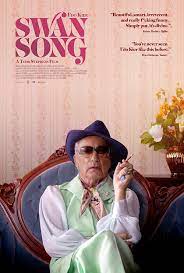
SWAN SONG
US, 2021, 106 minutes, Colour.
Udo Keir, Jennifer Coolidge, Linda Evans, Michael Urie, Ira Hawkins.
Directed by Todd Phillips.
This is a true story, an encounter by the writer-director, Todd Phillips, with an elderly man, Patrick Pitsenbarger, in Sandusky, Ohio. Patrick’s reminiscences, stories from other people around the town, some gossip. Patrick died in 2012.
Patrick is played by German and international character actor, Udo Kier, prominent in films since the 1960s, acting in Paul Morrisey/Andy Warhol Frankenstein and Dracula films, working for Rainer Werner Fassbender as well as Lars von Trier. In fact, he has appeared in over 250 films. But, it is no swan song for him, as he has appeared in four films in two television series since completing this film!
There is an indication of Patrick’s vision of himself in the prologue, an empty theatre, the curtain pulled back, the lights coming on, Mr Pat emerging to sing. However, in reality, he has been for many years in a home for the elderly, smoking forbidden cigarillos, incessantly folding up napkins neatly and storing them, going to the dining room, a touch aloof. Who is he? What has he been?
The answer comes fairly quickly – he has been the hairdresser in Sandusky, popular in the 1990s, but, in his memory, betrayed by his major client, the affluent Rita (a welcome cameo by Linda Evans of Dynasty fame, appearing in photos and then in a final ghostly sequence) and his major assistant, Dee Dee (played by Jennifer Coolidge in what must be one of her most laid-back performances). We discover that he is gay, has fond memories of his partner, David, an old friend, Eunice. But the main action here is that the administrator of Rita’s will tells him that she has asked for him to prepare her for her funeral. There is a bequest of $25,000, he refuses in a huff.
But, huffs not necessarily last long. Patrick escapes from the home, takes to the road into town, having changed his mind about the funeral. What happens then is a series of entertaining episodes, a friendly mechanic showing the way, a visit to his old house – to discover that it has been demolished but a friendly chat with the new owners who prepare him lunch – skipping with children, visiting shops, shoplifting lotions and alcohol, a visit to a clothes shop and the storekeeper remembering him on her only visit to the hairdresser, age 19, then he remembering her and all her family details, her giving him a pale lime suit and hat and he goes on his flamboyant way!
But, with pathos, he visits David’s grave, seeing his own name on the tombstone. He visits the club where he sang every Saturday night, a haunt for closeted gay men in the 1990s. It is to close that night and he returns, reminiscing, helping one of the Drag Queens with his hair, finding the old chandelier in storage and putting it on his head, dancing before he collapses.
Which means that Swan Song has an appeal to a camp sensibility.
Patrick does go to work on Rita’s funeral preparation, has an imaginary confrontation/discussion with Rita, reveals how strong their friendship was and how he had a sense of betrayal when she did not attend David’s funeral, after he died from AIDS. But, Patrick decides to forgive her, lovingly tends her hair and make up. And he receives some unexpected moral support from Rita’s grandson, Dustin (Michael Urie) who reveals how his grandmother listened to his declaration of his sexual orientation, quoting Patrick and David to her grandson.
Todd Phillips clearly wants us to experience something of the Patrick Pitsenbarger whom he met those years ago in Sandusky.
- The titles and expectations? Final performance? Before death?
- Sandusky Ohio, the American midwest, the town, the nursing home, the roads, shops, the club, mansions, funeral parlour, the river? The audience immersed in this town?
- The musical score, the range of the songs, artists, artists favoured by Drag Queens?
- Based on a true story, an actual character, Patrick Pitsenbarger, his encounter with him, collecting stories about him? His living in Sandusky, the filming there?
- The brief prologue, the empty theatre, the atmosphere for a swansong, lights, curtain, Mr Pat appearing, singing – and the recurrence of that image at the end?
- The film as a portrait of Patrick, in every scene? Udo Keir’s presence? Age, nursing home, in the dining room, in his room, folding the papers, the little cigars, the woman in the wheelchair and his giving her cigars, gratification? His doing her hair? And the revelation of his career, hairdresser, popularity in the town over the decades, patronage by Rita, her moving to Dee Dee, Dee Dee as his assistant, his condemnation of her betrayal and opening the rival parlour? Years of resentment? Life in the home?
- Flashbacks, his relationship with David, David and his gardening, memories of Eunice, the gay man, closeted in past decades, David and his death from AIDS? Gradual revelation of Patrick and his life, orientation, relationships, the visit to the Men’s and the contact with Eunice? The club, his performing their every week? The gradual revelation of his flamboyance, and his camp style?
- Rita’s death, the visit from the banker, her will, wanting him to prepare her for her burial? Patrick’s reaction, refusal, the promise of $25,000?
- Patrick and his change of heart, throwing all his folded pages around the room, getting out, walking on the road, the friendly mechanic, his collapse, but determined to walk, his decision to prepare Rita?
- The various activities around the town, the shops, people remembering him, not remembering him, skipping with the children, wanting the special lotion but its not being produced? His drinking? The limited amount of money? Shoplifting the liquor, the lotions in his trousers? The encounter with a banker, some cash, drinking the wine? His visit to his old house, disappeared, talking to the owners, memories, their kindness, giving him lunch? Going to the store, the clothes, the storekeeper remembering him, his eventually remembering her and all the details, her offering the suit, is wearing it, the hat? Looking the part, walking the town?
- Going to David’s grave, the sadness, the memories? His own name on the grave? Later going to the Men’s, imagining Eunice, sitting by the water, the reminiscing, the gay lifestyle of the 90s? Eunice’s name on the headstone?
- Going to see Dee Dee criticism and antagonism, the talk about the past, her gay assistant observing, Dee Dee and acknowledgement of Patrick, Rita as customer, the wanting to charge him for the lotion, eventually giving it to him?
- The deadline, meeting the banker, going to the funeral home, going to the bar, his memories, Gabriel at the bar, camp style, the story of the club, Patrick reminiscing, the news that it would close that night? His return, the crowds, the Drag Queens, the local big one Queen, ambitions, Patrick doing his hair, success? The dancing? Finding the chandelier, appearing and wearing it, his collapse, hospital? And his getting out of the hospital – and going to the funeral home?
- The funeral home, Dee Dee there, her telling him to go in, Rita, in the coffin, her appearance to Patrick, the reasons for the falling out, each confiding in the other during the 1990s, her knowing all about David, but the stigma of AIDS, the closeted men, her betraying him? Her appearing, explanations, his ultimately forgiving her? Using the lotion, preparing her hair and make up? His own make up?
- The encounter with Dustin, the welcome, reminiscences, Dustin and his talking with Rita, her understanding, telling him about Patrick is a gay man, the reassurance?
- Patrick, his care for Rita, his swansong? Ready to die?